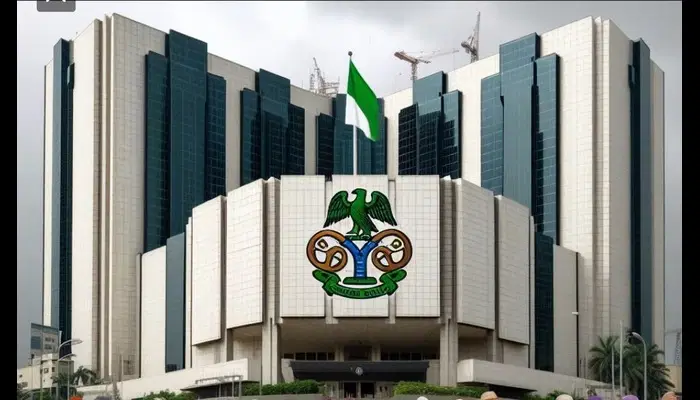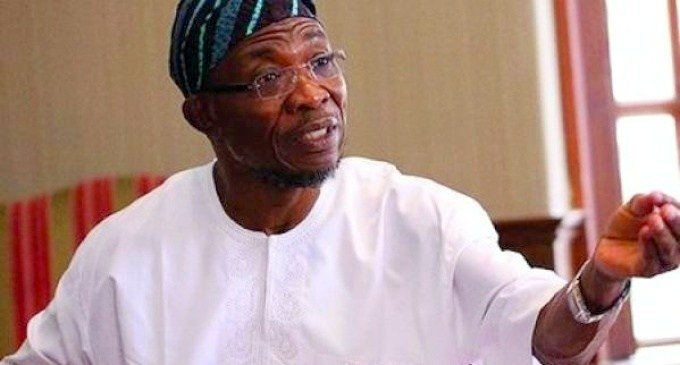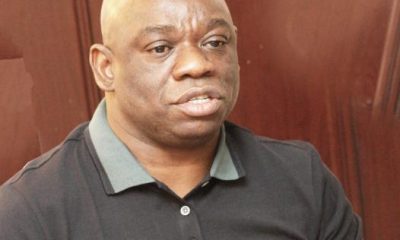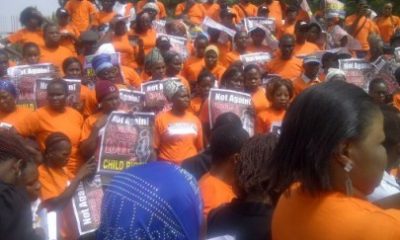business
Unemployment rises to 5.3% as CBN hikes interest rate to 27.25% | Prestige News


ADVERTISEMENT
The Nigerian Bureau of Statistics, NBS, yesterday, announced that Nigeria’s unemployment rate grew by 1.2 percentage points to 5.3 per cent year-on-year, YoY.
This came on a day the Central Bank of Nigeria, yesterday, raised the Monetary Policy Rate, MPR, by 27.25 per cent.
The NBS, which disclosed this in its Nigeria Labour Force Survey Report, said: “The unemployment rate for Q1 2024 was 5.3%, showing an increase from 5.0% recorded in Q3 2023. The unemployment rate among males was 4.3% and 6.2% among females. By place of residence, the unemployment rate was 6.0% in urban areas and 4.3% in rural areas for Q1 2024. “Looking at the youth, the youth unemployment rate was 8.4% in Q1 2024, showing a decrease from 8.6% in Q3 2023.
“Unemployment based on educational attainment shows that the unemployment rate among persons with post-graduate education was 2.0%, 9.0% among those with post-secondary education, 6.9% for those with secondary education, and 4.0% among those with primary education in Q1 2024.”
The survey also showed that the share of underemployed Nigerians declined 10.9 per cent in Q1’24 from 12.2 per cent in Q1’23.
According to NBS, underemployment is the share of the employed population who work less than 40 hours per week but are willing and available to be engaged for additional work hours.
It stated: “In Q1’24, the share of underemployed Nigerians was 10.9%, a decline of 1.4 percentage points from the 12.3 per cent recorded in Q3 2023.
“The share of the under-employed men was 8.5%, while the underemployment rate among women was 12.5% for Q1 2024. Disaggregating by place of residence, the underemployment rate in urban areas was 9.7% and 11.8% in rural areas.’’ On working-age Nigerians, NBS said: “In Q1 2024, 73.2% of Nigeria’s working-age population was employed, down from 75.6% in Q3 2023.
“Disaggregating by sex, the employment-to-population ratio was 74.2% for males and 72.3% for females in Q1 2024.
“Additionally, the employment-to-population ratio in urban areas was 69.5% and 78.9% in rural areas in Q1 2024. “This is a decrease in the ratio compared to the 71.1% and 80.7% in Q3 2023, respectively.
“The proportion of persons in self-employment declined from 86% in Q1 2023 to 84% in Q1 2024. Survey findings reveal an increase in the share of employed persons primarily engaged as employees between Q1 2024 (16.0%) and Q3 2023(12.7%).
“The self-employment rate among females was 87.9% while males were 79.9%. “Disaggregation by place of residence, the rate of self-employed persons in rural areas was 91.9% and 78.2% in urban areas.”
CBN hikes interest rate
Meanwhile, Private sector operators, including the Nigerian Association of Chambers of Commerce Industry, Mines and Agriculture, NACCIMA, Association of Small Business Owners of Nigeria, ASBON, Centre for the Promotion of Private Enterprise, CPPE, and other economic experts have warned against the increase in the Monetary Policy Rate, MPR, by the Central Bank of Nigeria, CBN.
The operators also stressed the fact that an increase in rate to 27.25% from 26.75% is detrimental to investment and economic growth of the country, even as they argued that the cost of borrowing will be further exacerbated, possibly well above 35% or more, creating more bad debt for banks or other financial institutions.
The MPR, set by the Monetary Policy Committee, MPC, of the CBN is a benchmark of the interest rate charged by banks to their customers.
This is just as an analyst at Renaissanceafrica Company, Mr. Ejike Nwuba disagreed with the latest unemployment figures, noting that the reality on the ground was far worse than the 5.3% rate released by the National Bureau of Statistics, NBS.
Meanwhile, Central Bank of Nigeria, CBN, yesterday raised the Monetary Policy Rate, MPR, by 50 basis points from 26. 75% to 27.25%, while retaining the asymmetric corridor of +500/-100 basis points.
The CBN governor, Mr Olayemi Cardoso, who disclosed this at the end of the 154th Monetary Policy Committee, MPC, meeting in Abuja yesterday, said the decision to further hike the rate was that of 11 members of the 12-member MPC present at the meeting.
The Cash Reserve Ratio (CRR) of Deposit Money Banks was also raised by 500 basis points from 45 per cent to 50 per cent; while that of merchant banks was raised by 200 basis points from 14 per cent to 16 per cent.
The committee retained the Liquidity Ratio at 30%.
Mr. Cardoso noted that despite the series of rate hikes of the administration, the nation’s Real Policy Rate remained negative, compared with the inflation rate of over 32 per cent.
“To attract investments into the economy, efforts must be sustained to achieve a positive real interest rate. This would enhance the economy’s competitiveness for international capital, thereby improving the exchange rate,” he said.
The governor put the country’s external reserves at $39.07 billion as of September 19, 2024, which he said can fund the nation’s import of goods and services for eight months.
Cardoso, who has spent nearly a year in office, said he is glad that he had rebuilt trust in the CBN which, according to him, has been refocused on its orthodox mandate and by making the foreign exchange market more transparent for all players.
He said the committee noted the moderation in headline inflation year-on-year in July and August 2024 and the relative stability and convergence in the exchange rate across the various markets, but that the “committee was, however, unanimous in recognising that a lot more is required to actualize the bank’s price stability mandate.”
He said: “The MPC noted that even though headline inflation trended downwards due to a moderation in food inflation, core inflation has remained elevated, driven primarily by rising energy prices.
“The uptrend poses severe concerns to members, as it clearly indicates the persistence of inflationary pressures. Members thus, reiterated the need to work in close collaboration with the fiscal authorities to address the current upward pressure on energy prices.
“The MPC noted the continued growth in money supply, recognising the need to curtail excess liquidity in the system as well as address foreign exchange demand pressures.
“Members were also concerned about the growing level of the fiscal deficit but acknowledged the commitment of the fiscal authority not to resort to monetary financing through Ways & Means.”
FAAC impact on banks’ liquidity, FX rate
The CBN boss said it was observed that each time funds were released by the Federation Account Allocation Committee, FAAC, liquidity levels in banks rose, adding that a direct impact was also felt at the FX market.
His words: “Furthermore, members observed a strong correlation between FAAC releases and liquidity levels in the banking system as well as its impact on the exchange rate.” He said that the development would be further observed, with a view to addressing it.
The CBN boss also noted the impact of insecurity on farming communities, which has a direct impact on the reduction of food production in the country, and required urgent attention in order to reduce the inflation rate.
Foreign exchange inflows
On foreign exchange inflows, Cardoso said his strategy is yielding desired results, with remittances in August alone put at $585 million.
He reiterated his resolve to attract greater remittances but warned that raising the value of the local currency, the naira, against the major currencies was beyond the CBN alone.
“Until the fundamentals are fixed, we will continue to sub-optimise. Oil production has to be ramped up to a level to carry the economy. We also need to diversify the economy. As long as we remain a monolithic economy, the exchange rate we all desire will continue to be hampered.
“As Nigerians, we must work for ways of import substitution. Our lust for foreign goods must change.
CBN is determined to play its role to ensure the market operates efficiently but it cannot substitute for the fundamentals,” he said.
Dangote Refinery‘ll reduce FX pressure — Cardoso
Cardoso expressed optimism that the Dangote Refinery will reduce pressure in the FX market as, according to him, between 10 and 15 per cent of current FX demand was for petroleum products.
He added that the nation’s FX position will greatly improve once the exportation of products from the refinery becomes a reality.
Increase in interest rate detrimental to economic growth — CPPE
Reacting to the raise in MPR yesterday, the Chief Executive Officer of the Centre for the Promotion of Private Enterprise, CPPE, Dr Muda Yusuf, said the increase was detrimental to investment and economic growth.
He stated: “It is quite troubling that at a time manufacturers, entrepreneurs and other investors in the economy are craving for a breath of fresh air, the CBN chose to tighten the noose on them by resorting to a further tightening of monetary policy.
“The latest policy choice of the apex bank is at variance with the mood of most economic players and the desire to promote economic recovery and growth.
“What manufacturers and other investors need at this time is some oxygen and stimulus, not policy measures that would worsen an already suffocating situation.”
Businesses’ll contract further — ASBON
President of the Association of Small Business Owners of Nigeria, ASBON, Dr Femi Egbesola, said the move would lead to further contraction in the real sector of the economy.
He said: “It’s unfortunate that this is coming again at this time, when manufacturers and actors in the real sector are still grappling with the high cost of doing business, among many other challenges.
“This definitely will push up further the cost of doing business and ultimately the cost of goods and services. The manufacturing sector may contract more as fund liquidity and profitability will surely reduce.
“The banks or financial institutions may witness more bad debts as many lenders may find it difficult to live up to their loan obligations. This will result in banks being averse to lending to the real sector.
“The economy may likely contract further, forcing the actors in the real sector to downsize their production capacities, human resources, expenditure and further exposure to loans.
“We may begin to see more ailing or comatose businesses. Our competitiveness in the national, continental and global business will be further be challenged as Made-In-Nigeria products will be naturally more expensive than before.”
‘Businesses’ll be burdened with higher loan costs’
Also, President of Nigerian Association of Chambers of Commerce Industry, Mines and Agriculture, NACCIMA, Otunba Dele Oye, said the CBN’s decision would further increase the cost of funds.
“As President of NACCIMA, I express concern over the CBN’s recent monetary policy rate hike to 27.25%. This decision burdens businesses with higher loan costs, exacerbating their struggles and failing to curb inflation or stabilize the naira.
“We urge the CBN to engage with stakeholders for a collaborative approach, considering alternatives like targeted sector support, deficit reduction, and promoting local production.
“A reassessment of strategies is essential to ensure effective economic management and sustainable growth in Nigeria. Dialogue and innovative solutions are crucial for repositioning our economy,” he stated.
Inflation must be tamed by monetary, fiscal authorities — Prof Uwaleke
Reacting to the increase in MPR , Prof Uche Uwaleke, President, Association of Capital Market Academics of Nigeria, ACMAN, said: “My take on the recent hike in MPR is that in matters like this, the CBN usually has information that may not be at the disposal of the public.
‘’I want to believe the members of MPC mean well for the economy and have taken the decision to further tighten monetary policy, based on strong evidence of major threats to exchange rate and inflation.
“All said, the task of taming inflation must be jointly tackled by both the monetary and fiscal authorities. So, the government has to play its part by controlling recurrent spending and focus on productivity, including ramping up assistance to small businesses.”
‘Unemployment reality on ground is far worse’
Commenting on the unemployment rate, Ejike Nwuba, CEO, The Renaissanceafrica Company Ltd, who disagreed with the latest unemployment figures, noted that the reality on the ground was far worse.
While noting that there was real unemployment and real underemployment in Nigeria, Nwuba said: “The obvious implication is that the economy will continue to nosedive drastically. It is the harbinger of an economy in ruins. The working populations are the lifeblood and assets of every economy.
“But when the youths and working population are unemployed and underemployed when a nation fails to leverage its human capital to grow and advance, the consequences can only be catastrophic.
“Our greatest resource as a nation is not minerals or natural resources but our people, our ability to unleash the potentials of our people.
“We need to learn how China turned their population of 1.4 billion into the world’s leading manufacturing hub today, and metamorphosed from one of the poorest nations in the world in the sixties to the world’s second-largest economy today, only bested by the United States, with a GDP of $17 trillion. Unemployment is too expensive. Nigeria is killing the goose that lays the golden eggs!”
On what could be done to reduce the rising rate of unemployment, he said: “First, we must transform our country from a consumerist import-driven economy to a productive export-driven economy.
“We must have deliberate, robust government policies to promote production. We must encourage indigenous /local production. This is why some of us were flabbergasted at NNPC and the minister’s initial stance on Dangote Refinery.
‘Cost of borrowing’ll rise’
Commenting on the CRR increase, Ayodeji Ebo, MD/ Chief Business Officer, Optimus by Afrinvest, said: “This will likely result in increase in borrowing costs, making it more challenging for businesses to sustain operations in the face of rising energy expenses.
“However, the impact on fixed-income rates may remain limited due to the high system liquidity in the financial system.”
Also reacting, Tajudeen Olayinka, Investment Banker and Stockbroker, said: “ I think the CBN is mindful of the negative consequence of lowering MPR to the current positive flow of foreign portfolio investment to the country, even though it needed to apply the same tool to keep inflation in check.
‘’This decision is expected to further slow down output growth or keep it at its current unsatisfactory level. The fact that a high interest rate regime has a way of filtering into the supply side of the economy to worsen the condition there, means that inflation will not disappear from the scene in a short while. However, further inflow of foreign portfolio investment will improve accretion to foreign reserves and provide more liquidity to the foreign exchange market.
‘’Unless this can improve the naira exchange rate in the immediate to near term, the concern around interest rate induced supply side inflationary impact will remain. Two things will make this possible: (i) A higher cash reserve ratio means that deposit money banks will have to price in the cost of keeping idle cash to their risk assets and other earning assets in order to recover the cost of deposit.
‘’I expect major repricing of earning assets to take place in the next few days. (ii) aggressive deposit mobilization will commence in earnest, with interbank rate hitting the roof in the immediate to near term.”
‘’This will also translate to improved yield in the fixed income space, while the equity market will continue to show resilience because of the large presence of local institutional investors actively playing in the market. The summary of the MPC decisions is that borrowing costs will remain elevated in the immediate to near term.
On unemployment, figure, he said : “ It is difficult to make any good sense from the inappropriate NBS unemployment computation model that emphasizes on one hour a week job. It just doesn’t add up. It is a deceitful measure of the unemployment rate in Nigeria.”
- Vanguard
-

 news7 years ago
news7 years agoOsun Government presents 2015, 2016 audited accounts…sets record as the first state in Nigeria to publicly declare accounts
-

 crime5 years ago
crime5 years agoArotile’s ex-classmate had no driver’s licence, report reveals
-

 lifestyle8 years ago
lifestyle8 years agoAmazing Tips for an Outstanding Makeup
-

 news4 years ago
news4 years ago2023: Kola Abiola Set To Declare For Presidency
-

 entertainment5 years ago
entertainment5 years agosanwo-Olu honours sacked chaplain after Ambode’s wife saga
-

 entertainment6 years ago
entertainment6 years agoSee how Women now use toothpaste to tighten vagina
-

 lifestyle5 years ago
lifestyle5 years agoUS Church ‘refunds members three years tithes’ as help during COVID-19
-

 business4 years ago
business4 years ago#EndSARS: Access Bank announces N50 billion interest-free facility for businesses

